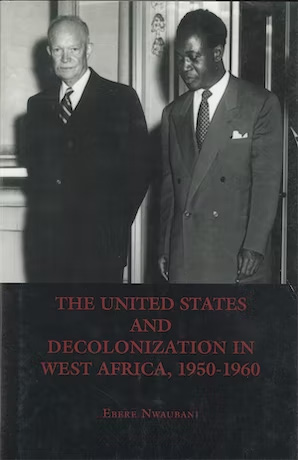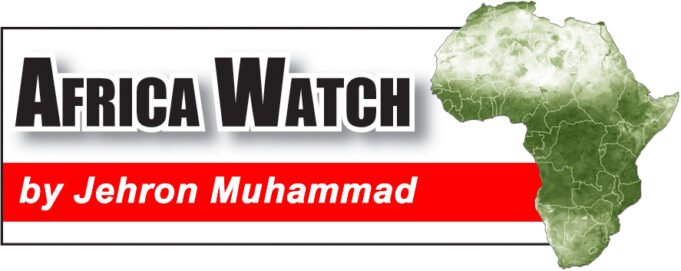America’s history of endorsing European colonialism and neocolonialism in face of the current scramble for Africa needs to be revisited. But to say U.S. endorsement without showing the material benefits the country derived as a “colonial accomplice,” is to give an incomplete narrative.
Case in point, according to the book, “The United States and the Liquidation of European Colonial Rule In Tropical Africa 1941-1963,” America’s 33rd president, Harry S. Truman, “conveniently side-stepped the experience of the Native Americans and asserted colonialism in any form is hateful to Americans,” it notes. “America fought her own war of liberation against colonialism, and we shall always regard with sympathy and understanding the desire of people everywhere to be free of colonial bondage,” the book continues. However, America’s historical actions belie this statement.

Taking this inaccurate retelling of history to heart, Congo’s Prime Minister Patrice Lumumba appealed to the U.S. government in 1960 for help in securing his democratically elected government. He was unaware that Dwight D. Eisenhower had already sanctioned his assassination.
In Susan Williams’ 2021 book, “White Malice: The CIA and the Covert Decolonization of Africa,” she writes, “This is a sign of the confidence and faith Lumumba had at this time in America’s support for the decolonizing nations of Africa and for democracy… But to Lumumba’s surprise and disappointment, America’s military help was not forthcoming.”
In fact, the U.S. Marine Corps was already in the Congo doing reconnaissance and protecting U.S. and European colonial interests. This led to the creation of the Shinkolobwe mine for the extracting of uranium which was later used for the making of the atomic bomb.
Ebere Nwaubani, author of the 2001 book, “The United States and Decolonization in West Africa, 1950-1960” wrote in his 48-page study: “With the imminence of independence in British West Africa—the translation of decolonization into neocolonialism became the thrust of United States policy in Africa. It is therefore safe to say that from Truman to Kennedy, the one constant in United States policy was a continuing, strong European presence and influence in Africa.”
Scott Bills, in his “The Roots of U.S.-Third World Antagonism, 1945-47,” observed that President Franklin Delano Roosevelt, “was anti-colonial in everything he said and in little that he did.”
To mark the anniversary of George Washington’s birthday Roosevelt did a broadcast where he stated: “We of the United Nations are agreed on certain broad principles in the kind of peace we seek. The Atlantic Charter applies not only to the parts of the world that border the Atlantic but the whole world.”
According to the journal, “The U.S. and the Liquidation of European Colonial Rule in Tropical Africa, 1941-1963,” the Atlantic Charter was designed for a number of propaganda purposes. “There was, at the time, a strong domestic pressure that the White House should do something about the British in India. Roosevelt needed to mollify the pressure, and for that, an invocation of the Atlantic Charter was convenient enough. More importantly, a careful reading of the broadcast shows that it was primarily intended to combat isolationism and rally Americans for the global war effort.”
There is indeed a hint that at a 1941 meeting between Roosevelt and British Prime Minister Winston Churchill, that the charter was said to apply to Europe only. In a message sent to Roosevelt, Churchill said, “We considered the wording of that famous document line by line together and I should not be able, without mature consideration, to give it a wider interpretation than was agreed between us at the time. Its proposed application to Asia and Africa requires much (more) thought.”
To give more substance to the U.S. being heavily invested in European colonial enterprise we go no further than the free state of Liberia, based in West Africa. It was established by the American Colonization Society. It was established to deal with the “problem” of the increasing number of free Blacks in the U.S.
According to Dr. Walter Rodney’s 1972 book, “How Europe Underdeveloped Africa,” economic partition and repartition of Africa was going on all the time because the proportions of the spoil that went to different capitalist countries kept changing. Special mention must be made of the U.S.A. because its share of the benefits from Africa was constantly increasing throughout the colonial period. America’s profits rose from $28 million in 1913 to well over $517 million in 1954.
Non-monetary benefits were far more valuable to the U.S. capitalist economy. The need for strategic raw materials for the functioning of industry and the country’s military machine ruled the day. Raw material for the making of rubber, that came from Liberia created U.S. corporate giant Firestone. The rubber and tire manufacturer became a “great friend and business colleague of Henry Ford. Liberian rubber turned the town of Akron, Ohio, into a powerful rubber tire manufacturing center, and the tires then went over to the even bigger automobile works of Ford in Detroit,” wrote Dr. Rodney.
—Follow @JehronMuhammad on Twitter













